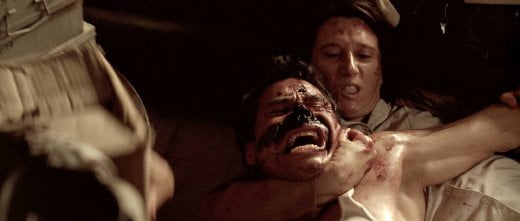We Are What We Are

A family living in the slums of Mexico City discovers that their father has died on the street. Their devastated mother (Carmen Beato, "Before Night Falls") sends her two sons, Alfredo (Francisco Barreiro) and Julian (Alan Chávez) to tend to their dad's watch and clock repair booth, but sister Sabina (Paulina Gaitan, "Sin Nombre") frets about their bigger problem - who will hunt the human needed for their family ritual and food? A downtrodden policeman discovers there are cannibals on his beat and is determined to hunt them down in "We Are What We Are."
Laura's Review: B-
Writer/director Jorge Michel Grau won Best Picture at 2010's Fantastic Fest with his first feature, and it is an ambitious undertaking. Grau equates his cannibal family much like Tobe Hooper's Texas clan - as disenfranchised poor people living on the fringes of society struggling with their own familial power structure. Grau's depiction of Mexico City's police is harshly satirical and he fleshes out his picture of the downtrodden with a group of prostitutes and a tribe of homeless kids living under a bridge. Things are further complicated when Alfredo, harshly judged for returning home with a trussed up hooker just like dad used to, decides to come out with his next choice. This is a society where everyone preys upon everyone else. As Gustavo tells Alfredo at a gay men's club, 'these wolves will gobble you up.' Grau also underlines the everyday violence these people live with, whether issued by the police or within the family. Mama is surprisingly brutal (it is she who beats the prostitute to death) when the occasion calls for it and Julian's temper loses the family its watch stand when he expresses his rage at economic inequality on a customer. Grau could have brought his ideas into sharper focus. Just what is 'the ritual' exactly, for example, and why is finishing it the only way to stop it? Clearly it has been performed before. But he has created a particular social landscape, uneasy suspense and even sympathy for his cannibals. Beato looks strained, always on the edge, Barreiro is uncomfortable being pushed into leadership. The film's best performance comes from Gaitan, almost feral. Grau uses silences well and the film's spare score (cello, violin, drum) alternates with the ticking of ever present clocks. The clocks, in fact, tie Grau's film to another Mexican horror, Guillermo del Toro's "Cronos." The film is dedicated to Alan Chávez, killed by police gunfire in 2009 at the age of 19.
Robin's Review: DNS
DNS

